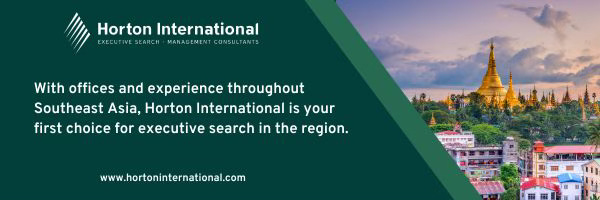Myanmar 20250805
Mekong Memo Myanmar Weekly: Business, politics, finance, trade & legal news.
Southeast Asian business news delivered to your inbox every weekday with the Mekong Memo.
The Memo is published each weekday for the countries of your choice. Paid subscriptions receive full editions while free subscribers usually only get top headlines and the first few stories. We can’t do this without your support, so please consider a paid subscription.
The Mekong Memo is proudly presented by:
Horton International is your premier partner for executive search in Southeast Asia. Whether you're a small startup or a global corporation, our reliable and effective recruiting solutions are tailored to meet your unique needs. With extensive experience and offices across the region, we excel at overcoming recruitment challenges and securing top talent for your organization.
Click here to learn how Horton can make your life easier.
Here is this week’s edition of the Mekong Memo for Myanmar.
If you appreciate the work that goes into preparing The Memo (and the time it saves you!), please consider a paid subscription to support our efforts. Thank you.
Headlines:
Election Gambit Continues
Crackdown and Control
Infrastructure Update: Steel, Roads
India Supporting Digital Identity Development
Rare Earths Supply Shapes Political Power
Environmental Crisis on the Mekong
Election Gambit Continues
The junta ended its state of emergency on July 31 in preparation for a December election that’s still fraught with skepticism. The junta has been claiming that the polls will be a win for the nation and be the return of multiparty democracy, but the idea that the election will be legitimate is… far fetched? The opposition says the vote is nothing more than a facade for military control, and Tom Andrews, the UN’s independent human rights expert on Myanmar, has gone as far as saying the elections are a "fraud." Japan's Foreign Minister Takeshi Iwaya criticized the plans, calling for an end to violence and the restoration of genuine democracy. The wider international community fears legitimizing the junta's behavior without the release of political prisoners like Aung San Suu Kyi. Tom Andrews also weighed in on the recent rollback of some US sanctions, calling the move “unconscionable.”
Read more: Ilkha (Election Strategy), Al Jazeera (Legitimacy Concerns), Arab News (Emergency Lifted), Reuters (Japan's Concerns), Jurist (US Sanctions), Eurasia Review (Diplomatic Words)
Crackdown and Control
Ahead of the planned elections, the junta has lowered the boom with a series of strict electoral laws. The new regulations anticipate severe punishments, up to and including the death penalty, for election-related dissent. The harsh penalties are, of course, intended to clamp down on dissent, but are doing nothing to answer the critics, including pro-democracy groups and international observers, who say the legal measures are an attempt to make sure the election isn’t fair.
Read more: The Business Standard (Election Laws), Al Jazeera (Legal Measures), ABC News (Law Details), Irrawaddy (Martial Law), Mizzima (Cybersecurity law)
Infrastructure Update: Steel, Roads
Despite the political insanity, several infrastructure projects are still moving forward as pillars of the military regime’s development plans. The junta announced plans to move forward with large-scale projects, including a Russian-backed steel mill. The mill is needed to cut reliance on foreign steel imports. India has confirmed that it is taking responsibility for the construction of two sections of the Trilateral Highway in Myanmar, including the ~120 km Kalewa-Yagyi road section, 69 bridges, and an “approach road” on the ~150 km Tamu-Kyigone-Kalewa (TKK) road section.
Read more: Irrawaddy (Steel Mill Project), Economic Times (Trilateral Highway)
India Supporting Digital Identity Development
India is also saying that it’s going to provide technology transfers and regulatory support for Myanmar’s digital identity systems. The big worry, of course, is that digital IDs will be used to make state surveillance easier.
Read more: Biometric Update
Rare Earths Supply Shapes Political Power
Myanmar's rare earth minerals are central to growing global interest, particularly from the US and China, thanks to their value as manufacturing inputs. Myanmar's rare earth output boomed after the coup, with China getting the lion’s share of the exports, but the United States is also eyeing these resources, weighing the cost/ benefits of working with different partners in the region.
Read more: New Security Beat (Geopolitical Tensions), CSIS (Mineral Stakes)
Environmental Crisis on the Mekong
Environmental degradation from unlawful mining in Myanmar's Shan State continues to damage the Mekong River. Scientists have measured heavy metal pollution affecting river life, a worry to hundreds of thousands of residents who live downstream. The river's declining viability, thanks to dams and unchecked mining, is causing alarm in areas that rely on its bounty. Despite the environmental fallout, an effective regulatory framework remains nowhere to be found.
Read more: Al Jazeera
That’s it for this week… THANK YOU.
Your voice matters to us. Feel we're missing something? Have additional sources to suggest? Don't hold back— reply and tell us what you think.
If you value the Mekong Memo, please consider buying (or gifting!) a paid subscription, sharing it on social media or forwarding this email to someone who might enjoy it. You can also “like” this newsletter by clicking the ❤️ below (or sometimes above, depending on the platform), which helps us get visibility on Substack.





